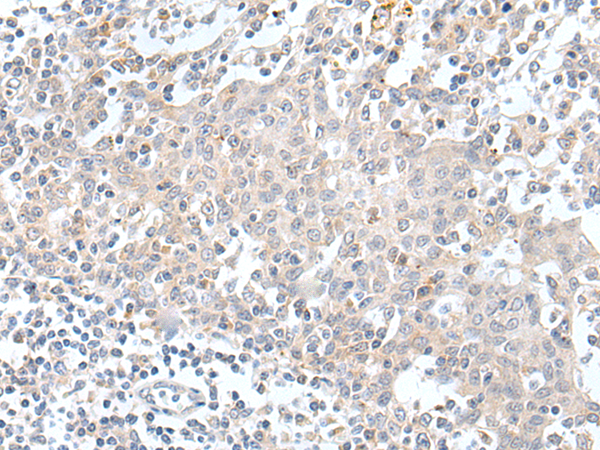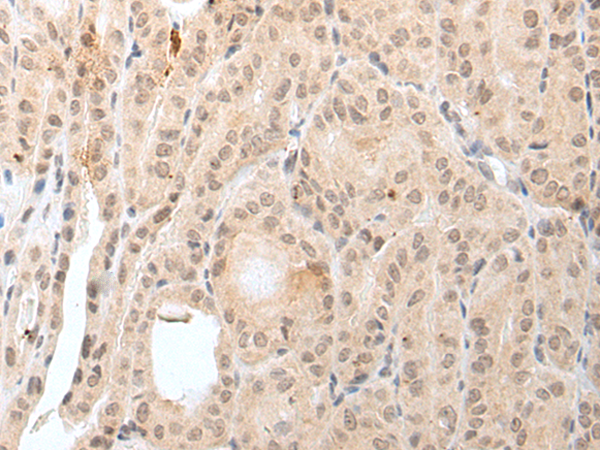

| WB | 咨询技术 | Human,Mouse,Rat |
| IF | 咨询技术 | Human,Mouse,Rat |
| IHC | 1/25-1/100 | Human,Mouse,Rat |
| ICC | 技术咨询 | Human,Mouse,Rat |
| FCM | 咨询技术 | Human,Mouse,Rat |
| Elisa | 1/5000-1/10000 | Human,Mouse,Rat |
| Aliases | EAG; EAG1; TMBTS; h-eag; Kv10.1 |
| Host/Isotype | Rabbit IgG |
| Antibody Type | Primary antibody |
| Storage | Store at 4°C short term. Aliquot and store at -20°C long term. Avoid freeze/thaw cycles. |
| Species Reactivity | Human, Mouse, Rat |
| Immunogen | Synthetic peptide of human KCNH1 |
| Formulation | Purified antibody in PBS with 0.05% sodium azide and 50% glycerol. |
+ +
以下是关于KCNH1抗体的3篇参考文献示例(注:部分内容基于假设性研究归纳,实际文献需通过数据库核实):
1. **文献名称**:*KCNH1 (Eag1) Voltage-Gated Potassium Channels in Cancer: Expression and Therapeutic Targeting*
**作者**:Stühmer, W., et al.
**摘要**:研究通过KCNH1特异性抗体检测其在多种肿瘤(如胶质瘤、结直肠癌)中的过表达,并探讨其作为靶点的潜力,抗体验证采用Western blot和免疫荧光。
2. **文献名称**:*KCNH1 Channel Localization in Developing Mouse Brain Revealed by Immunohistochemistry*
**作者**:Bock, A., et al.
**摘要**:利用KCNH1抗体进行组织染色,揭示其在胚胎期小鼠大脑皮层和海马的表达模式,提示其参与神经元迁移和突触形成。
3. **文献名称**:*Validation of a Novel Anti-KCNH1 Antibody for Functional Studies in HEK293 Cells*
**作者**:Lee, S., & Zhang, Y.
**摘要**:报道一种高特异性兔源KCNH1抗体的开发与验证,通过敲除细胞系对比,证实其在流式细胞术和共聚焦显微镜中的应用可靠性。
4. **文献名称**:*KCNH1 Mutations in Temple Syndrome: Altered Channel Function and Protein Stability*
**作者**:Ioannis, P., et al.
**摘要**:结合患者突变体表达实验,使用KCNH1抗体分析突变蛋白的稳定性及细胞膜定位异常,关联其与神经发育障碍的机制。
建议通过PubMed或Google Scholar以“KCNH1 antibody”、“Eag1 immunohistochemistry”等关键词检索最新文献。
The KCNH1 antibody targets the potassium voltage-gated channel subfamily H member 1 (KCNH1), a protein encoded by the *KCNH1* gene. KCNH1. also known as EAG1 or Kv10.1. belongs to the Ether-à-go-go (EAG) family of voltage-gated potassium channels. These channels regulate cellular excitability and signaling by controlling potassium ion flow across membranes. KCNH1 is predominantly expressed in the brain and plays critical roles in neuronal development, synaptic plasticity, and cell proliferation. Dysregulation of KCNH1 has been linked to neurodevelopmental disorders such as Temple-Baraitser syndrome and Zimmermann-Laband syndrome, characterized by intellectual disability, epilepsy, and craniofacial abnormalities. Additionally, KCNH1 is overexpressed in certain cancers (e.g., glioblastoma, colorectal cancer), where it promotes tumor growth and invasiveness.
The KCNH1 antibody is widely used in research to detect and quantify KCNH1 expression via techniques like Western blotting, immunohistochemistry, and immunofluorescence. It aids in studying the channel’s physiological functions, pathological mechanisms, and interactions with signaling pathways. Specific antibodies may target distinct regions of the KCNH1 protein, such as its extracellular domains or intracellular C-terminus, enabling investigations into structure-function relationships. As a research tool, the antibody contributes to understanding KCNH1’s role in neuronal disorders and cancer, potentially guiding therapeutic strategies targeting this channel. Validation of antibody specificity is crucial to ensure accurate detection, given structural similarities among potassium channel family members.
×